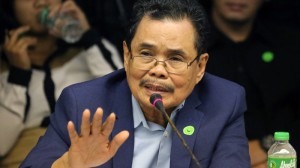Moro leader’s nom de guerre bothers senators
Some senators are perturbed by the use of a nom de guerre of Mohagher Iqbal, chief negotiator of the Moro Islamic Liberation Front (MILF), saying it could have legal implications and may affect the peace process with the government.
Sen. Ferdinand Marcos Jr., who chairs the hearings on the draft Bangsamoro Basic Law (BBL), said he wants to pursue the issue when the discussions on the bill resume next week.
Marcos has invited Iqbal to the hearing but the latter has yet to confirm his attendance.
The MILF chief negotiator on Wednesday admitted that the name “Mohagher Iqbal” was an alias—one of several he uses. It was natural for revolutionaries to resort to this practice, he said.
He had declined to disclose his real name but said it was known to the Department of Foreign Affairs, which issued him a passport.
Article continues after this advertisementMarcos said Iqbal’s “important” revelation raises a lot of questions and could also undermine the MILF’s sincerity.
Article continues after this advertisement“Beyond the legal implications, it calls into question the MILF’s good faith in entering into the peace agreement. Why deceive the Philippine government in this way?” Marcos said in a text message when sought for comment on the issue.
He said there were many things that would need to be explained when it comes to a key figure in the peace talks using another name.
“Who notarized the agreements he signed and what were the documents he presented identifying himself as Iqbal? Why did he feel the need to hide behind an alias? Who is he?” Marcos said.
He also wants to know if the government peace panel had been aware of the situation.
Sen. Vicente Sotto III said Iqbal’s use of an alias had “serious implications.”
“We might be violating provisions of the Constitution if we are dealing with unknown personalities regarding the creation of autonomous regions in our country,” Sotto said.
He went on to ask who among Iqbal’s aliases would sign the agreements with the Philippines.
The government’s peace process with the MILF has been in a fragile state since the Mamasapano incident, where police commandos targeting terror suspects in Maguindanao clashed with members of the MILF, the Bangsamoro Islamic Freedom Fighters and private armed groups.
At least 64 people died in the clash—44 police Special Action Force troopers, 17 MILF members and three civilians.
Following the incident, various groups questioned the sincerity of the MILF as peace partners and the wisdom of the draft BBL, a product of the peace deal that would create a new Bangsamoro region.
Hoping to save the peace process, the President formed a council of trusted leaders who would lead a National Peace Summit to deliberate on and discuss the BBL.
The members of the council are Manila Archbishop Luis Antonio Cardinal Tagle, retired Chief Justice Hilario Davide Jr., businessman Jaime Augusto Zobel de Ayala, former Ambassador to the Holy See and Malta Howard Dee and youth leader Rohaniza Sumndad-Usman.
